Questions On Brinegar 4-Year Ban For ‘Blood Doping’ Hang On Pending CAS Report After Rushed Ruling Halts 1500 Bid For Olympic Return
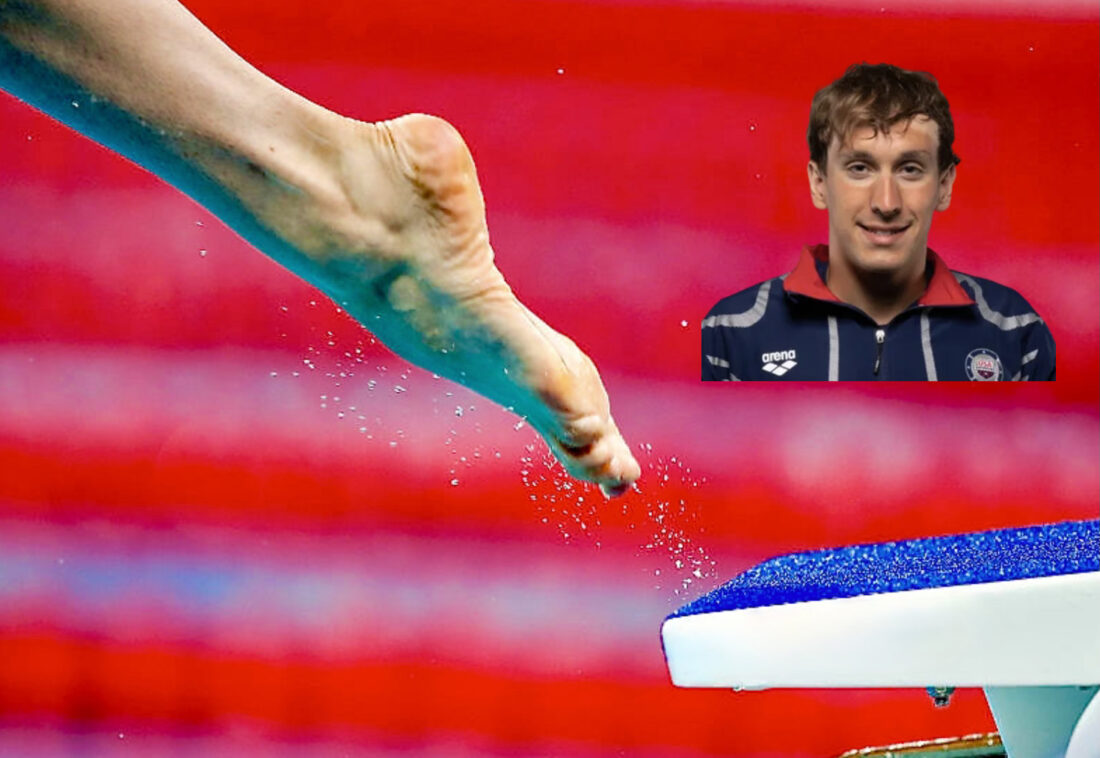
Answers to questions about the four-year suspension served on Michael Brinegar, the American Olympic swimmer, for “blood doping” will only be answered when the full report of the case is made public in due course.
Brinegar finished 12th in the 800m freestyle at U.S. Olympic Trials in Indianapolis last Monday but was forced to withdraw form the 1500m heats on Saturday after receiving news of that the Court of Arbitration for Sport (CAS) had agreed with the United States Anti-Doping Agency (Usada) in its challenge to an initial decision that Brinegar had not committed a rule violation.
The CAS ruling was delivered in an “operative award” that sets aside an initial decision that Brinegar did not commit a rule violation and replaces it with a four-year sanction for Brinegar’s “use of a prohibited substance and/or method resulting in an Adverse Passport Finding after highly abnormal blood values in his Athlete Biological Passport (ABP) were identified as being caused by blood doping”, according to Usada.
The ruling was rushed through to avoid Brinegar racing for a returned to the U.S. Olympic team in the 1500m at Trials over the weekend. The full CAS report will be published in due course – and until then, questions remain.
Blood doping is complex area is some key regards and the information released so far on Brinegar’s case does not answer all questions, including those over the precise nature and circumstances of any ‘blood doping’.
Swimming sources in the United States are, so far, bewildered by Brinegar’s case, not least of all because his mother, 1976 Olympian Jennifer Hooker, is a strong advocate for clean sport and had raised her son to understand the consequences of cheating.
Brinegar posted a reflection of that sentiment and his take on the whole sorry affair on Instagram:
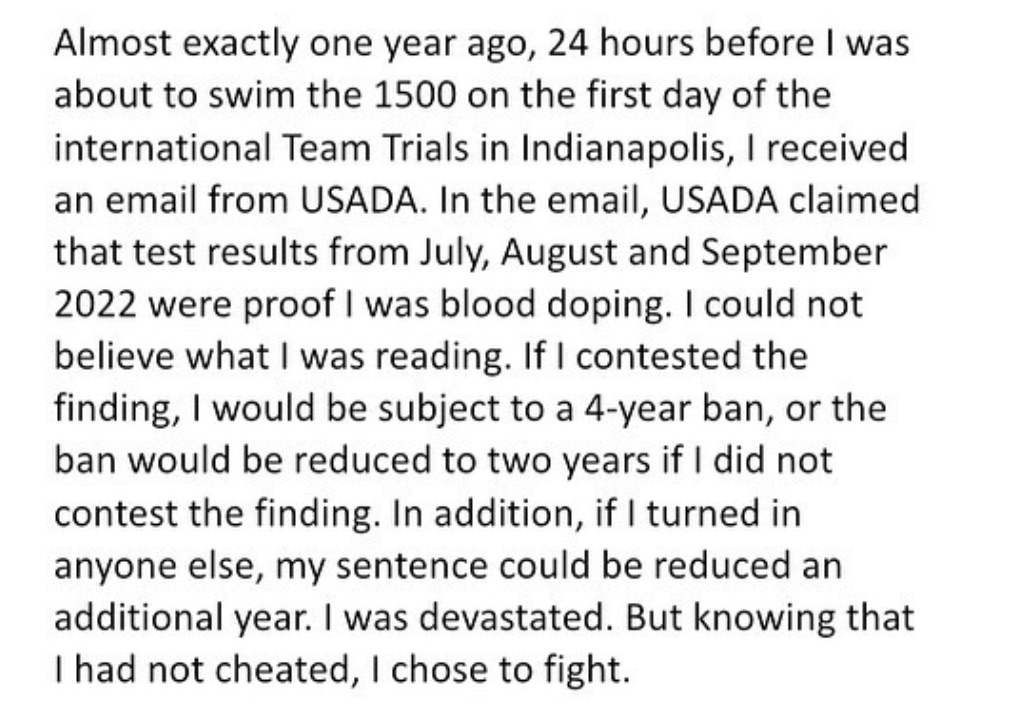
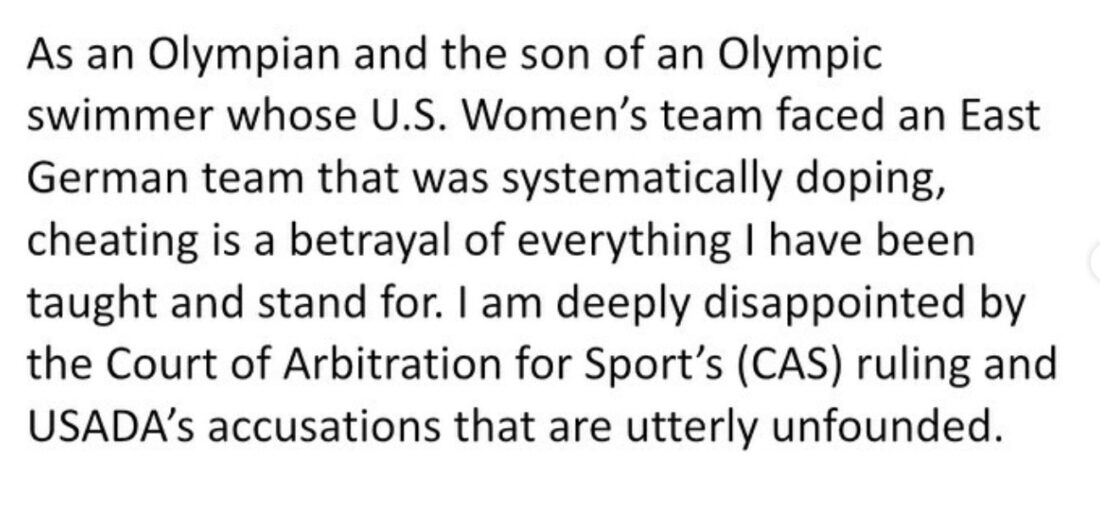
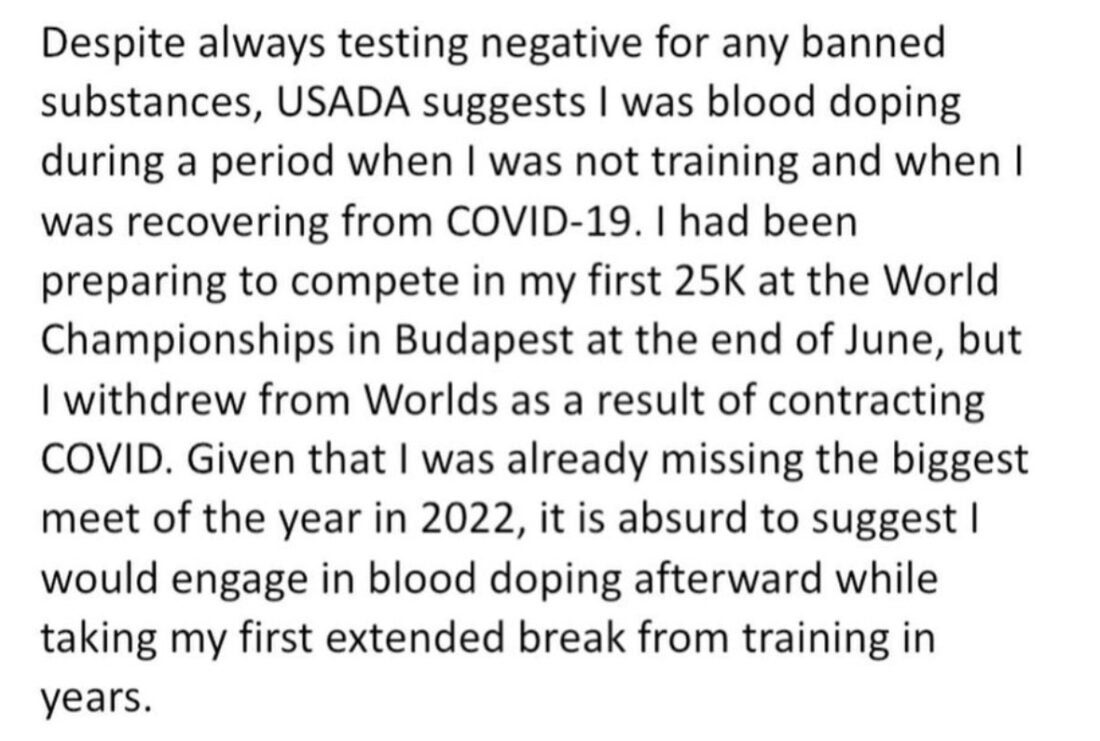
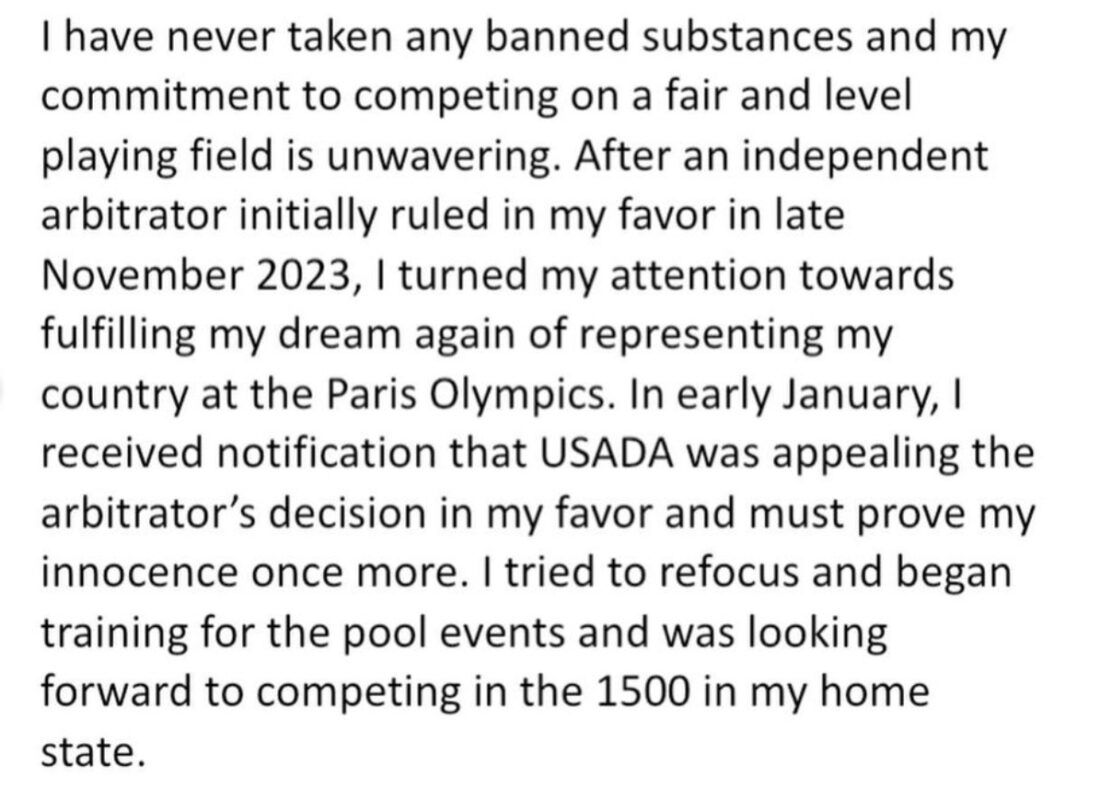
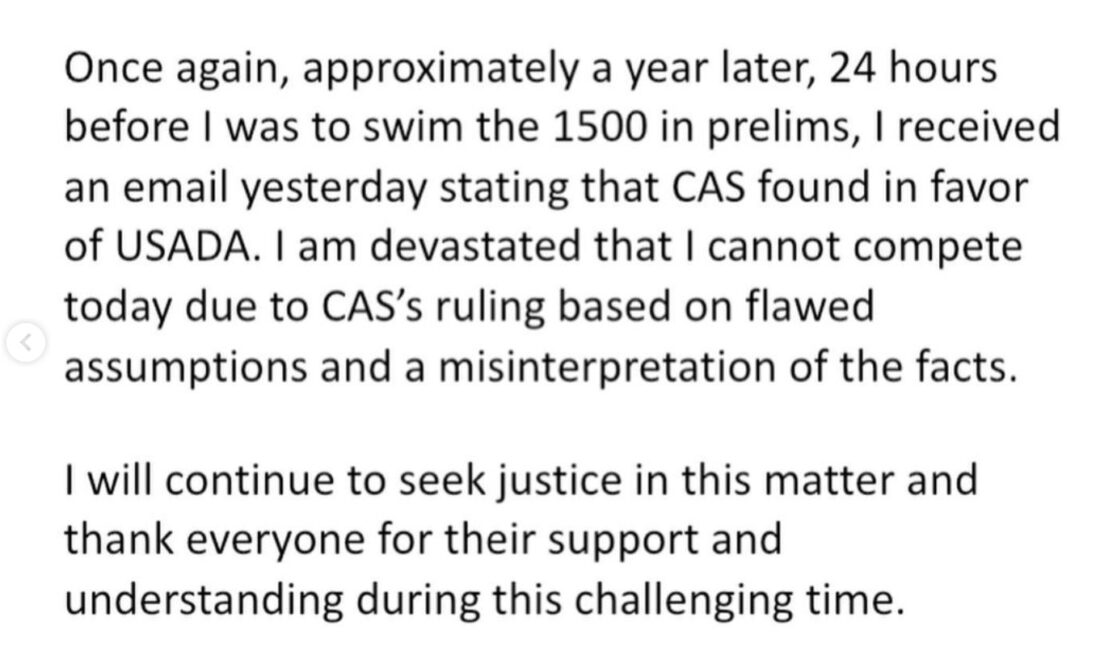
On Medium, Brinegar posted a long explanation of his experience and thoughts. Those include:
“Although I am still waiting for CAS’s full decision, in the spirit of transparency and a true commitment to clean sport, I want to provide insight into what has been occurring. You are reading about alleged abnormalities in my blood values. These abnormalities are being inaccurately molded into a narrative that expert medical testimony (a hematologist at the Mayo Clinic) and an independent arbitrator agreed did not add up, considering my documented COVID-19 infection, training and detraining periods, and improper handling of samples. Despite this and my consistent negative tests for any banned substance, USADA chose to ignore these factors.
“Considering I won my appeal by an independent arbitrator and USADA pushed forward anyway, I can’t help but feel like a pawn in their attempt to appear clean while pointing fingers at other countries. Am I paying the ultimate price of my dreams and reputation while being innocent? I remain committed to proving my innocence and upholding the integrity of clean sport. Not only that, but I also don’t want any other athlete to suffer the same unfair fate, so I am eager to expose a flawed system.”
In his explanations of the process he has lived through so far, Brinegar cites the independent arbitrator who found flaws in Usada’s allegations and ruled in the swimmer’s favour first time round. The arbitrators views included this:

“Based on all the evidence of record, the Arbitrator finds the values of Sample 9, Sample 10 and Sample 11 as well as the scientific analysis by the ABP experts of Respondent’s longitudinal profile, is not sufficient to establish Respondent committed an ADRV by the use of ESA, such as an EPO, or a Prohibited Method to the comfortable satisfaction of the Arbitrator. In so doing, the Arbitrator considered no blood samples were collected for a seven week period when Respondent was sick with the Covid-19 virus.”
Independent Arbitrator
You can read Michael Brinegar’s full and thoughtful take on his Medium Page.
Highlights from a swim journey
Beyond selection for the Tokyo2020ne Olympic Games, Brinegar’s biggest successes to date go back to his junior days: he was World Junior silver medallist in open water over 7.5km in 2016 and then 1500m in the pool a year later, when he also claimed bronze in the 800m.
When he was first alerted to an adverse finding in his longtitundinal blood passport in 2022, Brinegar was approached by Usada with the standard approaches made to those deemed to have violated the WADA Code: if he admitted wrongdoing he would be given a more lenient penalty; and that would be further reduced is he told the clean-sport watchdog the names of any who had assisted with the knowledge and methodologies required to cheat with blood doping.
Brinegar refused on grounds that he had nothing to confess. His coach in California Mark Schubert, former team director for USA Swimming, backed the swimmer and said that it made no sense to offer reduced sentences in returned for confessions and insider knowledge if an athlete believed themselves to be innocent. Schubert believes Brinegar’s profession of innocence to be genuine, he has told U.S. media.
The reasons why questions are left unanswered at this stage in the Brinegar case is explained in a Usada statement issued today.
The Usada Statement On Brinegar in Full
Colorado Springs, Colo. (June 24, 2024) – USADA announced today that a three-arbitrator panel of the Court of Arbitration for Sport (CAS) has rendered a decision in an appeal after USADA challenged the initial decision in the case of swimming athlete James “Michael” Brinegar of Columbus, Ohio. Brinegar’s case was heard to ensure resolution in advance of team selection decisions related to the upcoming Paris Olympic Games.
The CAS award sets aside the initial decision that Brinegar did not commit a rule violation and instead imposes a four-year sanction for Brinegar’s use of a prohibited substance and/or method resulting in an Adverse Passport Finding after highly abnormal blood values in his Athlete Biological Passport (ABP) were identified as being caused by blood doping.
The hematological ABP was launched in 2009 and comprises an individualized longitudinal data set designed to evaluate athletes’ various blood biomarkers over time. Blood doping methods such as blood transfusions and the use of Erythropoietic Stimulating Agents (ESAs) like erythropoietin (EPO) have measurable effects on certain biomarkers in the blood.
By analyzing an athlete’s blood values over time, experts can identify atypical patterns associated with blood doping while excluding natural variability. In this case, three samples collected from Brinegar between July 20, 2022 and September 27, 2022 showed values consistent with blood doping, specifically the use of ESAs, as confirmed by unanimous expert evaluation of Brinegar’s blood profile in early 2023.
The use or attempted use of ESAs and manipulation of blood or blood components, including, but not limited to blood transfusions, are prohibited at all times under the USADA Protocol for Olympic and Paralympic Movement Testing, the United States Olympic & Paralympic Committee (USOPC) National Anti-Doping Policies, and the World Aquatics Doping Control Rules, all of which have adopted the World Anti-Doping Code (the Code) and the World Anti-Doping Agency Prohibited List.
Brinegar’s four-year period of ineligibility began on June 21, 2024, the date the CAS panel’s decision was issued. He receives credit for the time he was provisionally suspended from August 18, 2023 to November 27, 2023. In addition, Brinegar has been disqualified from all competitive results from July 20, 2022 through December 31, 2022, the dates encompassing his abnormal blood samples, including forfeiture of any medals, points, and prizes.
Given the athlete’s comments prior to this release, it’s worth noting that, under the rules, athletes are eligible for a one-year reduction to the default four-year period of ineligibility for admitting to a violation within a specific time frame, and USADA provides notice of this eligibility, as required by the rules.
In cases like this, where others may be involved, USADA also investigates and seeks any and all information about other athletes or support personnel who may have assisted in the violation. And under the rules, an athlete’s substantial assistance can result in a reduction to their period of ineligibility based on the extent of the cooperation and evidence provided regarding others’ violations.
Brinegar retained legal counsel after being charged with a violation and chose to proceed to arbitration. As required by the rules, WADA, the International Testing Agency, USA Swimming, and the USOPC were notified of the initial decision, and the CAS decision has now been publicly released since a violation and sanction have been imposed.
Because a decision was needed before team selection decisions were made, the CAS panel issued an operative award, which is an abbreviated document that only conveys the panel’s ruling. The operative award can be found here, and the reasoned decision will be made publicly available once it is rendered.
End off statement
The Brinegar case dates back to 2022 but has only just come to light because of process that coincides with the separate and unrelated cases of 23 Chinese swimmers who tested positive for a banned heart booster in January 2021 but were cleared by Chinese authorities. Several swimmers were on to win titles and medals at the Tokyo 2020ne Olympic Games.
The difference in the American and Chinese handling of cases is a factor Usada may be keen to point out. That difference includes an American case in which national authorities pursue the athlete with an adverse finding all the way through investigation and a test at the CAS, and multiple Chinese positives that were never contested or challenged because the World Anti-Doping Agency accepted Chinese explanations of “mass contamination” at a time when neither it nor its investigators had access to China under Covid pandemic restrictions.
An investigation into WADA’s decision on the Chinese is due to deliver a preliminary report of findings anytime soon.
Meanwhile, only the details of the CAS report can explain Brinegar’s full argument for his innocence and the reasons why Usada and a CAS panel beg to differ and what form of blood doping/manipulation would be useful for an 800/1500m man in the pool.
Brinegar Case Tears At Heart Of Indiana Uni Swim Family
Hooker who at 15 finished sixth in the 200m freestyle at the 1976 Olympics in Montreal at the first Games at which testosterone-fuelled East German teenage girls dominated the women’s competition.
Hooker, who swam for Indiana University, also raced in the heats of the 4x100m freestyle to qualify an American quartet for a final that would deliver the only gold medals for the USA in female racing in 1976. That story is told in “The Last Gold” documentary but Hooker did not receive gold for her efforts in heats: rules at the time only award medals to those who raced in relay finals.
Hooker later received a business degree at Indiana in 1984, and later practiced law after receiving a Juris Doctor degree from Vanderbilt University. In 1996, she also received a Master’s in Sports Management back at Indiana University, where she worked as assistant athletic director in 1999.
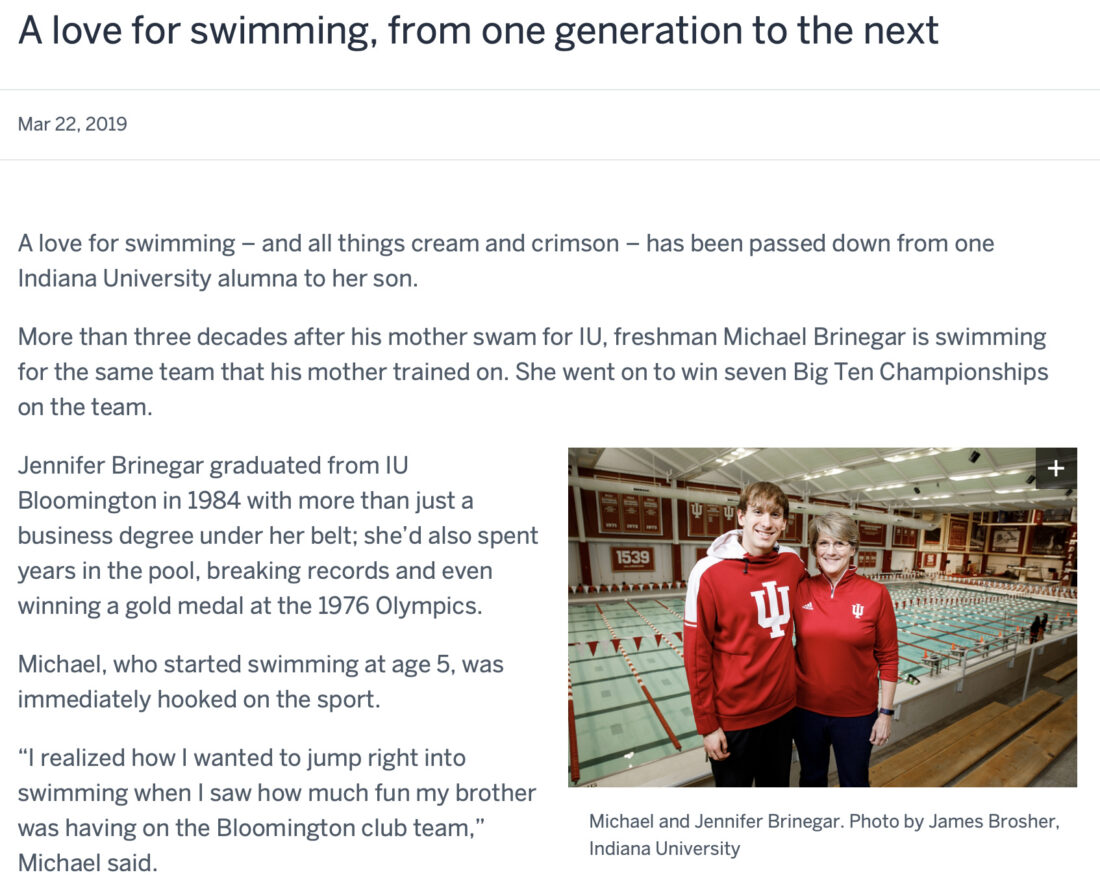
Back in 2019, Indiana Uni ran a feature on its website headlined “A love for swimming, from one generation to the next”.
It reported on “A love for swimming – and all things cream and crimson” that had been “passed down from one Indiana University alumna to her son.”
More than three decades after his mother swam for IU, freshman Michael Brinegar is swimming for the same team that his mother trained on. She went on to win seven Big Ten Championships on the team, the report noted.
It explained that “Michael and Jennifer have had parallel careers in the pool”, Jennifer Brinegar having “turned to the same coach who trained her until she became a student-athlete at IU… She knew coach Mark Schubert could give Michael the same strong swimming foundation she’d gained years before when she spent her high school years training with him in Mission Viejo, California. She decided to move there to ramp up her training.”
At Indiana Uni, with its rich tradition of developing Olympic medallists, the head coach was another leading name in American swim teams: Ray Looze.
It looked as though Michael Brinegar was in a good place, and not one associated with blood doping.
The publication of the full CAS report is required before the imbalance between Brinegar’s profession of innocence (and the absence of confession or informant statement on anyone who might have assisted in a stated case of ‘blood doping’) and the CAS ruling and backing of Usada’s challenge can be weighed.
Michael has posted on Medium deeper insight into what is going on along with text pulled directly from the independent arbitrator hearing. You can find the link on his Instagram.
Thank you. Appreciated. I have added Michael’s thoughts and references to the file.